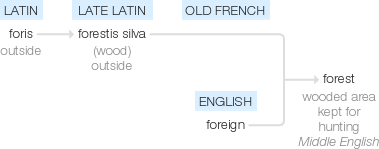Forest
Middle English (in the sense ‘wooded area kept for hunting’, also denoting any uncultivated land): via Old French from late Latin forestis (silva), literally ‘(wood) outside’, from Latin foris ‘outside’ (see foreign).
wiktionary
From Middle English forest, from Old French forest, from Medieval Latin forestis(“open wood”), first used in the Capitularies of Charlemagne in reference to the royal forest (as opposed to the inner woods, or parcus), of uncertain origin. Compare Old Saxon forest, forst(“forest”), Old High German forst(“forest”), Modern German Forst(“forest”).
Medieval Latin foresta probably represents the fusion of two earlier words: one taken as an adaptation of the Late Latin phrase forestis silva(“the outside woods”), mistaking forestis for woods (—a development not found in Romance languages; compare Old French selve(“forest”)); the other is the continuance of an existing word since Merovingian times from Frankish *forhist(“forest, wooded country, game preserve”) as the general word for "forest, forested land". The Medieval Latin term may have originated as a sound-alike, or been adapted as a play on the Frankish word. In the latter case, this would make forest a doublet of frith.
Displaced native Middle English weald, wald(“forest, weald”), from Old English weald, Middle English scogh, scough(“forest, shaw”), from Old Norse skógr, and Middle English frith, firth(“forest, game preserve”), from Old English fyrhþ.
etymonline
forest (n.)
late 13c., "extensive tree-covered district," especially one set aside for royal hunting and under the protection of the king, from Old French forest "forest, wood, woodland" (Modern French forêt), probably ultimately from Late Latin/Medieval Latin forestem silvam "the outside woods," a term from the Capitularies of Charlemagne denoting "the royal forest." This word comes to Medieval Latin, perhaps via a Germanic source akin to Old High German forst, from Latin foris "outside" (see foreign). If so, the sense is "beyond the park," the park (Latin parcus; see park (n.)) being the main or central fenced woodland.
Another theory traces it through Medieval Latin forestis, originally "forest preserve, game preserve," from Latin forum in legal sense "court, judgment;" in other words "land subject to a ban" [Buck]. Replaced Old English wudu (see wood (n.)). Spanish and Portuguese floresta have been influenced by flor "flower."
forest (v.)
"cover with trees or woods," 1818 (forested is attested from 1610s), from forest (n.). The earlier word was afforest (c. 1500).
